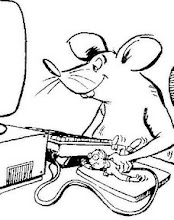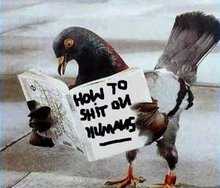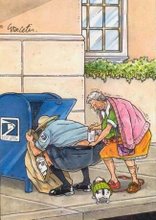
Friday, August 17, 2007
Thursday, August 16, 2007
Burdened by debt single mother postal worker lottery-winner now richer than kings...
In the West, modern fairytales start here and never get any more glamorous, with a porky single-mum postal worker from a provincial Scottish town scaling odds of 76-million-to-one to become Britain's biggest-ever lottery winner and richer today than royal princes and pop stars.
Angela Kelly, daughter of a postman and a low-earning transport manager in a Glasgow postal office, has won a staggering £ 35.4 million, making her richer than Princes William and Harry and the massed ranks of many other celebrity millionaires.
Kelly can now expect to earn £ 21,000 per week in interest from her earnings. As a postal worker, she earned the same sum - £ 21,000 – in a whole year. It would have taken Kelly about 1,500 years to earn the amount of her win.
Kelly confessed on Wednesday, two days after she learnt she had won, that the multi-million-pound cheque came as she was heavily in the red. "I was in overdraft", the 40-year-old separated mother-of-one admitted, even as she described her sense of shock at her good fortune.
Sections of the British media described the down-at-heel postal worker as "the embodiment of Lady Luck - a Scottish postal worker picked out by the fickle finger of fate to become the UK's biggest National Lottery winner."
In an amazing turnaround, Kelly was, till last week, concerned like thousands of her mail office colleagues, with job security even as Britain's Royal Mail faces industrial action, swinging national cutbacks and consequently reduced pay cheques. Kelly said she had been preoccupied the morning she learnt of her lottery win with the reduced salary she expected at the end of the month. "Even one day less of pay makes a difference," she said. But now, Kelly is rich enough to bankroll the entire Royal Mail, if she chooses, quite apart from being rich enough to buy multiple stately homes, her own yacht, charter a plane or indulge in a champagne-fuelled life less ordinary.
Her stupendous win is the largest lottery payout ever in Britain. Kelly won after buying a £ 1.50 ticket on the Euromillions lottery, which is played across nine European countries – the UK, Austria, Belgium, Ireland, Portugal, France, Luxembourg, Spain and Switzerland. Recently, India's largest lottery operator lost out in its bid to run the UK's National Lottery.
Kelly's public appearance on Wednesday, before hundreds of journalists, made the UK gasp with the suppressed yearnings of the hundreds of thousands who play the National Lottery every week in the hope of winning millions.
Kelly said she was utterly "flabbergasted" at becoming the UK's biggest lottery winner. She described how she did not realise she had won until Monday, August 13, a full 48 hours after the winning number was announced. It was during a routine break while at work on Monday, she said, that she checked her ticket. She said she had to get five colleagues to check that she had won because she could not believe it. "I couldn't even say anything, I just pushed my chair back and put my head between my knees, I was so flabbergasted," Kelly said.
She said she only checked her lottery ticket after she read in a newspaper that the lottery windfall the cash had gone unclaimed. Kelly, who blew a small fraction of her extraordinary win on her first-ever indulgence – a manicure costing less than £ 50 – said she was still deciding how to spend her money. "I feel totally in limbo. I just need to sit down to get my thoughts together", she said.
Kelly's win is seen as one of the most remarkable in Britain and the continent. The biggest EuroMillions jackpot to date was £77 million, won by mother-of-six Dolores McNamara, of Limerick, Ireland, in July 2005.
Britain's 13-year experience of lottery sweepstakes has been alternately admiring and controversial. Many hail it has a success story that has made nearly 2,000 ordinary people into millionaires overnight and helped thousands of charitable causes. But many others have criticized it as a sneaky further means of government taxation, an excuse to top up government coffers and make gambling more socially acceptable and accessible.
The lottery's extraordinary purchase on the minds – and spending habits - of British and European punters has also been described as a vulgarity that enshrines the idea that money can buy happiness.
With some bankruptcies and the occasional suicide among lottery millionaires, the newest lottery-winner may have her work cut out trying to prove that sudden and unexpected monetary good fortune does not automatically bring moral hardship.
Angela Kelly, daughter of a postman and a low-earning transport manager in a Glasgow postal office, has won a staggering £ 35.4 million, making her richer than Princes William and Harry and the massed ranks of many other celebrity millionaires.
Kelly can now expect to earn £ 21,000 per week in interest from her earnings. As a postal worker, she earned the same sum - £ 21,000 – in a whole year. It would have taken Kelly about 1,500 years to earn the amount of her win.
Kelly confessed on Wednesday, two days after she learnt she had won, that the multi-million-pound cheque came as she was heavily in the red. "I was in overdraft", the 40-year-old separated mother-of-one admitted, even as she described her sense of shock at her good fortune.
Sections of the British media described the down-at-heel postal worker as "the embodiment of Lady Luck - a Scottish postal worker picked out by the fickle finger of fate to become the UK's biggest National Lottery winner."
In an amazing turnaround, Kelly was, till last week, concerned like thousands of her mail office colleagues, with job security even as Britain's Royal Mail faces industrial action, swinging national cutbacks and consequently reduced pay cheques. Kelly said she had been preoccupied the morning she learnt of her lottery win with the reduced salary she expected at the end of the month. "Even one day less of pay makes a difference," she said. But now, Kelly is rich enough to bankroll the entire Royal Mail, if she chooses, quite apart from being rich enough to buy multiple stately homes, her own yacht, charter a plane or indulge in a champagne-fuelled life less ordinary.
Her stupendous win is the largest lottery payout ever in Britain. Kelly won after buying a £ 1.50 ticket on the Euromillions lottery, which is played across nine European countries – the UK, Austria, Belgium, Ireland, Portugal, France, Luxembourg, Spain and Switzerland. Recently, India's largest lottery operator lost out in its bid to run the UK's National Lottery.
Kelly's public appearance on Wednesday, before hundreds of journalists, made the UK gasp with the suppressed yearnings of the hundreds of thousands who play the National Lottery every week in the hope of winning millions.
Kelly said she was utterly "flabbergasted" at becoming the UK's biggest lottery winner. She described how she did not realise she had won until Monday, August 13, a full 48 hours after the winning number was announced. It was during a routine break while at work on Monday, she said, that she checked her ticket. She said she had to get five colleagues to check that she had won because she could not believe it. "I couldn't even say anything, I just pushed my chair back and put my head between my knees, I was so flabbergasted," Kelly said.
She said she only checked her lottery ticket after she read in a newspaper that the lottery windfall the cash had gone unclaimed. Kelly, who blew a small fraction of her extraordinary win on her first-ever indulgence – a manicure costing less than £ 50 – said she was still deciding how to spend her money. "I feel totally in limbo. I just need to sit down to get my thoughts together", she said.
Kelly's win is seen as one of the most remarkable in Britain and the continent. The biggest EuroMillions jackpot to date was £77 million, won by mother-of-six Dolores McNamara, of Limerick, Ireland, in July 2005.
Britain's 13-year experience of lottery sweepstakes has been alternately admiring and controversial. Many hail it has a success story that has made nearly 2,000 ordinary people into millionaires overnight and helped thousands of charitable causes. But many others have criticized it as a sneaky further means of government taxation, an excuse to top up government coffers and make gambling more socially acceptable and accessible.
The lottery's extraordinary purchase on the minds – and spending habits - of British and European punters has also been described as a vulgarity that enshrines the idea that money can buy happiness.
With some bankruptcies and the occasional suicide among lottery millionaires, the newest lottery-winner may have her work cut out trying to prove that sudden and unexpected monetary good fortune does not automatically bring moral hardship.
Tuesday, August 14, 2007
Get paid to shed flab in Italy
Overweight residents of an Italian town will be paid to lose weight.
Men living in the northwestern Italian town of Varallo, which has 7,500 residents, will receive 50 euros ($70) for losing 4 kg (9 pounds) in a month. Women will get the same amount for shedding 3 kg (7 pounds).
If they can keep the weight off for 5 months, they will get another 200 euros ($280).
Men living in the northwestern Italian town of Varallo, which has 7,500 residents, will receive 50 euros ($70) for losing 4 kg (9 pounds) in a month. Women will get the same amount for shedding 3 kg (7 pounds).
If they can keep the weight off for 5 months, they will get another 200 euros ($280).
Monday, August 13, 2007
Goat crowned king of Ireland at ancient fair
Jimmy, a feisty white mountain goat, was crowned king of Ireland on August 10 at one of the country's oldest fairs.
Dating back centuries, the Puck Fair is an annual festival of drinking, music and dancing celebrated in the town of Killorglin in southern Ireland. Each year a male goat is caught in the surrounding mountains, paraded through the town to a beat of drums and pipes, and then placed in a 40-feet (12 metre) stand where he reigns as king for three days.
The origins of the fair are not totally known, but it always falls on August 10-12. One theory suggests mountain goats alerted residents of the town to an impending attack by English leader Oliver Cromwell's forces in the 17th century.
Another theory says it may have pre-Christian links due to the goat being a pagan fertility symbol like the god Pan.
Around 100,000 to 150,000 visitors are expected to attend this year. Precautions have been taken at the event, which also features separate horse and cattle fairs, due to a foot and mouth outbreak in England. Disinfectants have been used, and mats have been placed wherever there animals are displayed.
Jimmy himself will receive regal treatment, being fed regularly and checked by his own personal vet. At the end of 3 days, when he is dethroned, he is brought back up to the mountains and released to join his fellow nanny goats to resume his pastoral duties.
Dating back centuries, the Puck Fair is an annual festival of drinking, music and dancing celebrated in the town of Killorglin in southern Ireland. Each year a male goat is caught in the surrounding mountains, paraded through the town to a beat of drums and pipes, and then placed in a 40-feet (12 metre) stand where he reigns as king for three days.
The origins of the fair are not totally known, but it always falls on August 10-12. One theory suggests mountain goats alerted residents of the town to an impending attack by English leader Oliver Cromwell's forces in the 17th century.
Another theory says it may have pre-Christian links due to the goat being a pagan fertility symbol like the god Pan.
Around 100,000 to 150,000 visitors are expected to attend this year. Precautions have been taken at the event, which also features separate horse and cattle fairs, due to a foot and mouth outbreak in England. Disinfectants have been used, and mats have been placed wherever there animals are displayed.
Jimmy himself will receive regal treatment, being fed regularly and checked by his own personal vet. At the end of 3 days, when he is dethroned, he is brought back up to the mountains and released to join his fellow nanny goats to resume his pastoral duties.
Sunday, August 12, 2007
Subscribe to:
Comments (Atom)



















